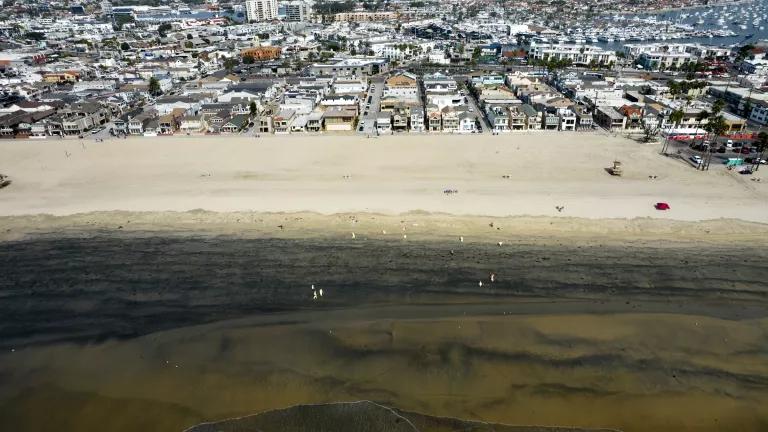New Rule Ups Big Oil’s Financial Responsibility for Offshore Clean-up
The Bureau of Ocean Energy Management’s new rule takes a meaningful step towards holding industry accountable for the true costs of oil and gas drilling.

Oil facilities in the waters of the shallow continental shelf in the Gulf of Mexico
For decades, coastal communities, marine life, and taxpayers have been paying the price for the wells and drilling platforms that Big Oil leaves behind in our ocean. A new rule from the Bureau of Ocean Energy Management (BOEM) takes the first step towards addressing idle and abandoned infrastructure by increasing financial assurance requirements for the offshore oil and gas industry. BOEM’s rule will raise an estimated $6.9 billion from oil and gas companies, which will help protect taxpayers from footing the bill to clean up offshore wells and platforms that industry leaves behind.
Although oil and gas lessees currently commit to plugging wells and decommissioning platforms within one year after the end of their lease or when facilities are no longer useful for operations, industry has routinely failed to meet these obligations on time—or at all. The Government Accountability Office (GAO) reported that, for Gulf of Mexico leases that ended in 2010 through 2022, operators missed end-of-lease decommissioning deadlines for over 40% of wells and 50% of platforms. As of June 2023, over 1,700 end-of-lease wells and 300 end-of-lease platforms in the Gulf of Mexico were delinquent.
The cost to taxpayers of cleaning up this mess could be massive. If companies do not meet their obligations, GAO’s report estimated that the public would be on the hook for at least $36.5 billion in decommissioning liabilities. The risk of companies permanently abandoning offshore wells and platforms is very real. Thirty-seven offshore oil and gas operators have filed for bankruptcy since 2009. And BOEM and its sister agency, the Bureau of Safety and Environmental Enforcement (BSEE), expect bankruptcies to continue increasing, according to GAO’s report.
By collecting bonds or other financial assurance from oil and gas companies before they start drilling, BOEM can ensure that there will be enough money to cover decommissioning costs even if companies go bankrupt or otherwise fail to meet their obligations. Although all companies pay basic financial assurance to BOEM, the agency waives supplemental financial assurance for companies who can demonstrate that they are financially strong—a sign to the agency that companies will be able to afford decommissioning costs when their leases expire or their wells and platforms are no longer useful. However, for years BOEM’s financial strength criteria were too weak, resulting in billions of dollars of potentially uncovered liabilities.
BOEM’s new rule sets stronger financial standards for waiving supplemental financial assurance. The rule will require more companies than before to pay supplemental financial assurance, helping protect taxpayers from bearing the cost of industry neglect.
Properly plugging wells and decommissioning platforms is essential to protect the Gulf. Abandoned oil wells and platforms are an oil spill waiting to happen. Over time, tanks, pipelines, and platforms are corroded by the ocean. As infrastructure degrades, it grows more vulnerable to hurricanes, which can topple or destroy platforms and potentially trigger disastrous oil spills. In 2004, for example, Hurricane Ivan caused a mudslide that destroyed a Taylor Energy oil platform and more than twenty wells, resulting in the longest-running U.S. oil spill ever. In addition, unplugged wells can leak oil and drilling fluids into the sea, where oil is toxic to many marine wildlife. Abandoned infrastructure also creates collision hazards for other vessels in the area, putting the safety of vessel crew members at risk.
While the new rule is an important first step, more action is needed to protect taxpayers and clean up idle iron in the Gulf. BOEM can further enhance its financial assurance requirements by, for example, eliminating value of proved oil and gas reserves as a criterion for waiving supplemental financial assurance. BSEE should follow GAO’s recommendation to strengthen its procedures for enforcing decommissioning deadlines. And BOEM should establish a strong fitness to operate standard to ensure that companies who fail to meet decommissioning deadlines—or who violate environmental and safety rules—cannot obtain new leases or permits to operate in the Gulf.
BOEM and BSEE must ensure that oil companies—not taxpayers—bear the costs of cleaning up wells and platforms.

